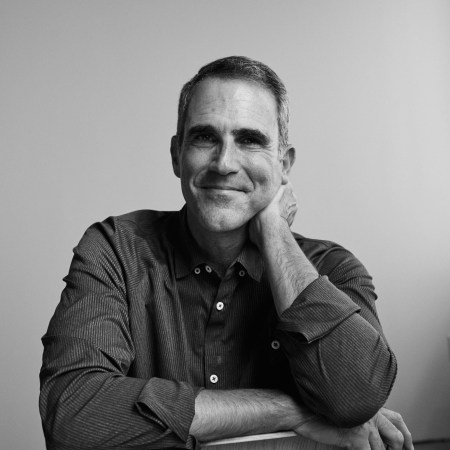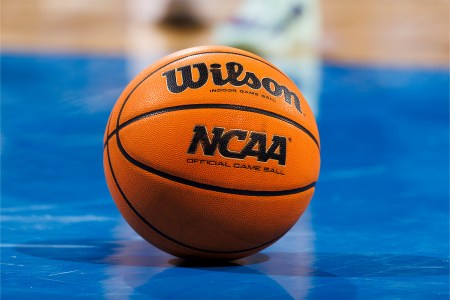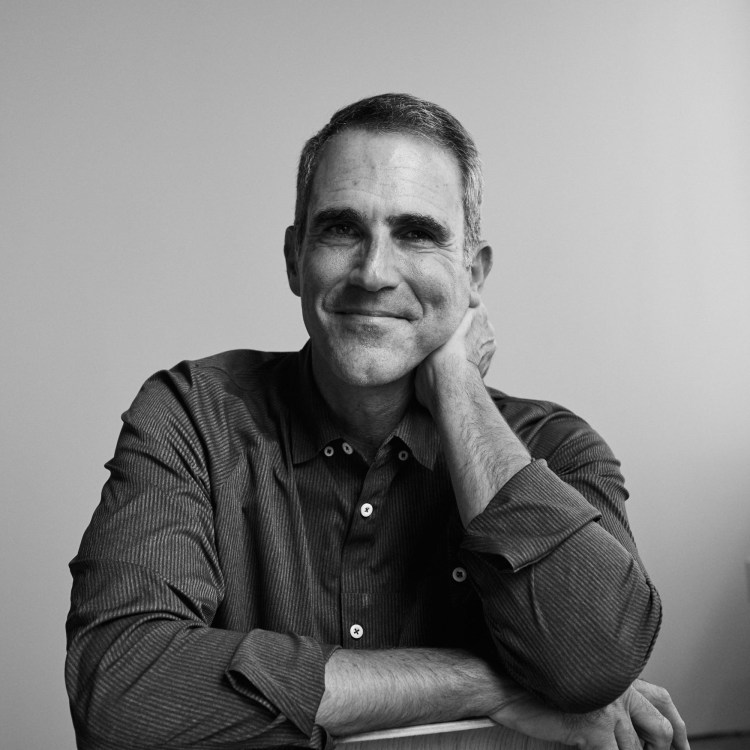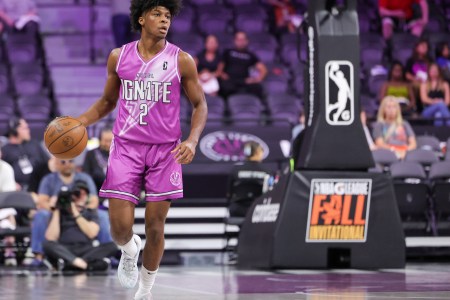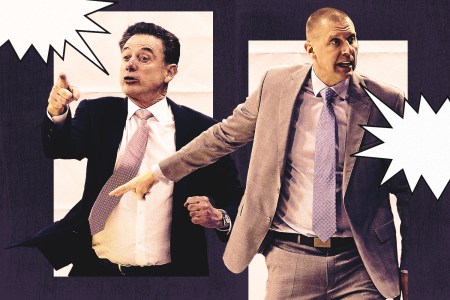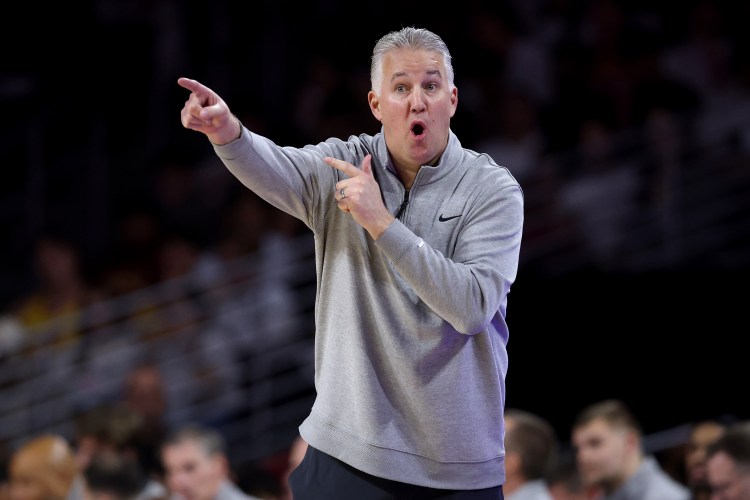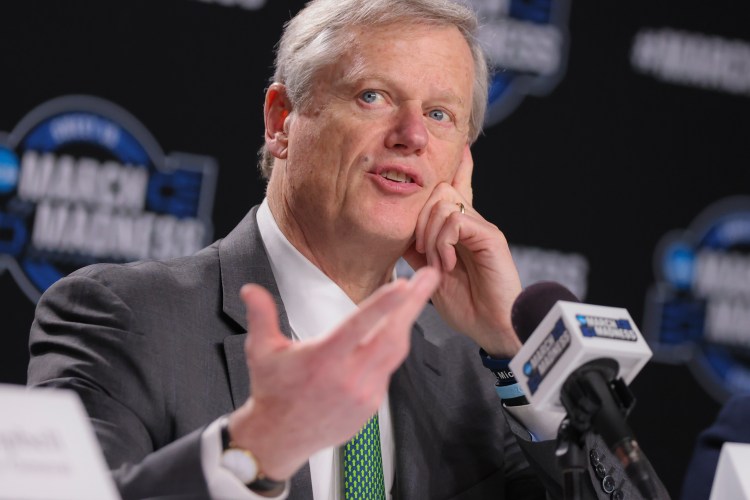It’s altogether fitting that Grant House was wearing a swimsuit when he took the phone call that upended his life and changed the course of history.
This was the spring of 2020, at the height of the Covid-19 pandemic. House was a junior at Arizona State and a member of the swim and dive team. He and his teammates had been training off-site at the Eldorado Acquatic and Fitness Center in Scottsdale. After the workout, the swimmers were lying beside the pool, tanning themselves on towels, when House overheard a fellow swimmer talking to her mother.
“I have the perfect guy for you,” she said. Then she handed House her phone.
House became intrigued as his teammate’s mother, an attorney with the law firm Hagens Berman, explained that her firm planned to file a class action antitrust lawsuit against the NCAA and was searching for potential plaintiffs. House was indeed a perfect fit. Besides being an elite swimmer in one of the nation’s top programs, House was a straight-A student who was the president of ASU’s Student-Athlete Advisory Committee. He had also won two silver medals for the U.S. at the 2019 Pan Am Games and a gold in the 2019 World University Games in Naples, Italy. House was thoughtful, articulate and poised, a natural-born leader. He immediately understood the larger mission of the case.
That conversation led to a few more with other lawyers, one of whom asked if House would be willing to serve as a named plaintiff. “I saw it as a no-brainer,” House told Hoops HQ. “I figured I can help more athletes. I can advocate for them. I can help uplift them and give them new opportunities. Absolutely no question in my mind.”
House, 26, may have understood the basic merits of the case, but like so many young people, he didn’t know what he didn’t know. Four months later, he was driving and noticed his mother had tried to call him several times. He pulled over and rang her back. She answered in a panic, having learned that “House sues NCAA” headlines were rocketing around the internet. According to House, the lawyers told him that he had another week before they were going to file. He planned on having more extensive conversations with his family and people at ASU to prepare them.
Now, however, he had to pivot into full damage control. That included conversations with several ASU administrators who were livid at having been blindided by the news that one of their most prominent athletes was in effect suing them. “It kind of all came crashing down,” House said. “I thought I had a lot more time to tell people and inform people, because that’s what the lawyers had said. At that point, I didn’t understand the magnitude of what it was.”
That would not be the last time House was unpleasantly surprised during what has been an unpredictable, unsettling, disruptive, purposeful and immensely consequential journey. The case is technically called Grant House and Sedona Prince v. National Collegiate Athletic Association, et al. (Prince is a basketball player at TCU), but it is commonly referred to as House v. NCAA, or more succinctly “the House case.” (And more recently, “the House settlement.”) The case and the two attendant class actions (Carter v. NCAA and Hubbard v. NCAA) have combined with previous rulings (most notably O’Bannon v. NCAA and Alston v. NCAA) to shatter the NCAA’s longstanding amateurism model, thereby ushering in a new era in which college athletes can finally get paid for their efforts. U.S. Judge Claudia Wilken, who has presided over all these cases from her courtroom in Oakland, is potentially days away from certifying the settlement that was negotiated between the parties. That agreement includes $2.75 billion in payments to former athletes and establishes a system of revenue sharing and governance over Name, Image and Likeness contracts moving forward. There are many questions as to how all of this will work after it is implemented in July, but for an industry that for so long refused any whiff of progress, the transformation has been rapid, dizzying, chaotic and seismic.
It would be inaccurate to say all of this is happening because of a single swimmer at Arizona State. But for better or worse — and there is plenty of both — it is House’s name that has been blasted in headlines and dragged through the mud. “Every time I see the headlines, I wonder how people are receiving it,” he said. “Some people don’t even know House is a person. They think it (stands for) House of Representatives”
For House, the strangest part is how detached he has been from the process, especially over the last two years. He has had no role in the negotiations, made exactly one appearance as a spectator in Judge Wilken’s courtroom and has barely met his own lead attorneys. Nor is he kept informed about the negotiations over the settlement. He gets his news from the media, just like the rest of us.
“A lot of people think I’m the mastermind behind it, but my actual involvement in the inner workings of the case has been pretty minimal and quite infinitesimal,” he said. “To be here and know that I’ve had really no voice in this settlement has been unfortunate, upsetting and disappointing.”
That, alas, has not innoculated House from facing blowback, antipathy and even some death threats, both through social media and face-to-face — including, most painfully, from his fellow swimmers. He has vacillated between speaking out and laying low, between digging for more information and letting it all go so he can focus on his swimming, an effort he hopes will include the 2025 World Championships in Singapore (House will attempt to qualify next week at the U.S. Trials in Indianapolis) and the 2028 Olympics in Los Angeles.
“To be here and know that I’ve had really no voice in this settlement has been unfortunate, upsetting and disappointing.”
Grant House
House admits there have been times when he wishes he never took that phone call more than five years ago, but he stayed the course for the same reason he started it: He believed things needed to change. “I don’t know what’s going to come at the end of this,” he said. “Even five years into this, I still don’t know how each day is going to unfold. But I believe I’m on the right side of history.”
“You deserve to die.”
House usually doesn’t answer calls from blocked numbers, but for some reason, this time he did. He was lying on his couch one evening last October when the call came in. The stranger spewed invective for about 20 seconds before House hung up on him. It was an extreme example of the harassment House has faced since taking on the case, but there have been many, many others. “At first it was just one or two messages every time a news article broke,” House said. “Then it turned to five to ten. You’re ruining this sport. You’re the worst person ever. You’re gonna take this away from my son. I was like, okay, now parents are messaging me.”
Which was problematic, because swimming is hard enough — a “grueling and unforgiving sport,” as House put it. It was something he was born to do. House was raised in Indiana as part of a swimming family. Both his parents as well as his older brother and sister swam competitively. His parents coached the sport at the high school and club levels for several decades. Grant showed so much promise that his parents moved to Ohio so he could attend Cincinnati’s St. Xavier Prep, which has one of the nation’s premier swimming programs. He won 13 state championships, captured a gold medal in the 800 free relay at the 2015 Junior World Championships in Singapore and was rated by one swimming publication as the No. 4 high school recruit in the nation.

Though Arizona State did not have much pedigree in swimming at the time, House chose to go there because the school had just hired Bob Bowman, who coached Michael Phelps at the North Baltimore Aquatic Club and had recently been the coach at Michigan. House thought he could help Bowman build a powerhouse in the desert. During his time with the Sun Devils, House won multiple Pac-12 titles and helped ASU to sixth place at the 2022 NCAA championships and second in 2023. When the Sun Devils won the NCAA championship the year after he graduated, House felt almost as gratified as if he were still on the team. “Obviously, I wanted to be there holding the trophy myself, but a big reason I came to Arizona State was to create something bigger than myself,” he said.
That was the same motivation that drove him to join the case against the NCAA. When House first heard the idea, he thought back to a conversation he had had with his freshman year roommate, who was writing a song he hoped to record and monetize. “Isn’t it crazy that this could be a top 100 hit and I could make a lot of money, but you can’t (because of NCAA rules)?” he said. That comment spurred House’s activism, which included several trips to the Pac-12 headquarters in San Francisco to advocate for athletes’ rights.
Once House dove into the lawsuit, it was all he could do to tread water. He put in a lot of time the first several months, holding dozens of phone calls with attorneys and helping them assemble documentary evidence. He prepared extensively for a seven-hour deposition in January 2023, during which he was cross-examined by the NCAA’s lawyers. Emilee Sisco, an attorney at Hagens Berman, was House’s primary point of contact, but ever since the deposition, House’s involvement in — and knowledge of — settlement discussions has been close to nil.
“I didn’t even know negotiations were happening because I wasn’t asked about it,” he said. “I’d get a call from different coaches, different athletes, my agent at the time, saying hey, the Pac-12 just signed off, the Big Ten just signed off. I’m just cooking ground beef and a steak and rice in my kitchen and that’s the first I’m hearing of it. It felt quite debilitating, to say the least.”
House has been especially disappointed that he has had limited contact with his lead attorney Steve Berman. When asked to respond, Berman told Hoops HQ that that is not unusual for a class action case because the named plaintiff technically has the same standing as the thousands of others who are being represented. Berman also conceded that in many ways he, too, was unprepared for the intense scrutiny that was unleashed when all of this began. “When we filed the case, we never thought it would get the attention that it did,” Berman said. “We understand that at times Grant probably feels a little overwhelmed because of the attention that his name has gotten. There was no magic in putting his name first. It’s just an unusual circumstance, which I understand that he didn’t foresee and may at times not like, but he’s weathered that well.”
As the impacts of all these cases began to ripple across college sports, non-revenue sports like swimming faced some grim financial realities. That caused a lot of frustration, and House became an easy target. “I feel like I’ve been shunned by the swimming community,” he said. He was confronted by other swimmers during a meet at Cal Poly soon after the school announced it was cutting the program. At the 2023 NCAA championships, House was standing in an open area just before the start of his biggest race when an NCAA official came up to him and said, “You’re ruining the sport of swimming. Because of you, events like this won’t happen anymore.” Said House, “This was maybe ten minutes before my race. It was quite startling, to say the least.”
House understood that he could take his name off the case and be rid of all the hassle, but he never reached that point. “That’s the easy choice to make,” he said. “I felt like, if I back down from this opportunity and I quit on this, then who’s going to stand up for athletes and who’s going to have the courage to go forward? Because it’s not about me.”
“It breaks my heart to see his intentions misrepresented and see some of the negative comments that people put out there when they don’t know the whole story.”
Sue House, Grant’s mother
House originally planned to pursue a Master’s in Exercise Physiology, but he switched to Sports Law and Business so he could be become better informed on what he had gotten himself into. Meanwhile, he pursued his swimming goals with the usual abandon. At the 2024 Olympic Trials in Indianapolis, he reached the semifinals of the 200 meter freestyle and the finals of the 200 meters IM, where his seventh-place finish came excruciatingly short of the top-six required to make the U.S. national team and the top-two needed to make the Olympics. “Being so close was incredibly gut wrenching,” House said. “But you don’t get there by mistake. I knew I deserved to be there. I knew I was one of the best in the world.”
When House heard the death threat from that anonymous caller last fall, he sank to an emotional low. He hinted at his struggles during a FaceTime conversation with his mother, Sue. She decided to pay a visit to Tempe, where Grant explained in greater detail the negativity he had been facing. “I could see how it was impacting his mental health and I was concerned about it,” Sue House said. “It breaks my heart to see his intentions misrepresented and see some of the negative comments that people put out there when they don’t know the whole story.”
MORE ON THE HOUSE SETTLEMENT
House v. NCAA Settlement or Not, Revenue Sharing Is Coming to College Sports
Judge Wilken gave the parties in NCAA v. House two weeks to revise their settlement to her liking. But even if she rejects them again, the new era will begin this summer.
The House Settlement Will Allow Athletes To Get Paid, But It Comes at a Cost
If some power brokers have their way, the schools will have a new method for limiting compensation
That visit helped convince House that he needed to get off of social media. “It wasn’t contributing any positive energy into my life,” he said. “I realized I can control what I see and what I don’t see, and just be my authentic self. Now my joy has gone up. My emotional capacity has increased. I know my performance in the pool has increased.”
House’s training requires two to seven hours of swimming and strength work per day. He has found some modeling work on the side and hosted a podcast the last few years called The Swim Bros, but his primary professional pursuit has been towards his career as a strength and performance coach. He works at Streamline Performance Physical Therapy in Phoenix and coaches dozens of athletes from all over the country. His clientele includes several Major League Baseball players.

In early April, House was competing at a meet in Sacramento and decided to drive down to Oakland and attend a hearing hearing in Judge Wilken’s courtroom. He introduced himself briefly to the judge and thanked her for her work. That was also the only time he met attorney Jeff Kessler, who joined the case as co-counsel a year after House signed on but is not House’s attorney. House watched the hearing from the front row and then headed back to Tempe.
House could hardly have imagined all that would transpire when he first agreed to lend his name to this cause. He has learned more about the American legal system than he ever planned, and gained some hard-won wisdom along the way. “There’s been a lot of emotional turbulence over the last five years,” Sue House said. “I do think he’s learned from all this that doing the right thing and standing up for what you believe in isn’t always easy. I just hope he realizes that his whole family is proud of him.”
Assuming Judge Wilken approves the settlement, House will be eligible for the same payout as the rest of the 400,000 or so co-plaintiffs, although his attorneys have requested additional rewards for the named plaintiffs as compensation for the time they put in. That will finally bring to an end the grueling and unforgiving journey House has traversed these last five-plus years. The waters have been choppy at times, but if he had the choice to do it all over again, he would still dive in. “Yes, absolutely,” House said. “It’s a huge cultural shift to see athletes are becoming the architects of their lives and of their careers. There’s no question that athletes know they need better, they want better, and they deserve better. We’re going forward now, and I don’t think we’ll ever go back.”
